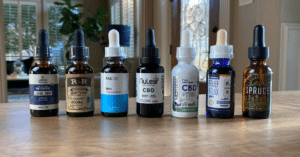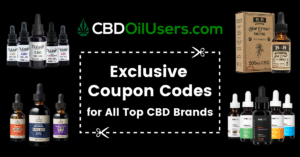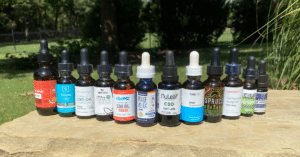For better or worse, drug testing has become commonplace in the United States. People are subject to drug tests by employers, pain management doctors, law enforcement officials and others for a multitude of reasons. And the consequences of failing a drug test can be catastrophic for some.
So it’s no surprise that one of the most frequently asked questions about CBD is whether using it can cause a positive drug test. This is an important question given the potential ramifications so it deserves an honest answer. Especially since there is a fair amount of inaccurate information out there about this topic.
Will Using CBD Result in a Positive Drug Test?
Let’s cut right to the chase: if you’re not willing to accept some risk of a positive drug test, then you should not use any CBD product.
That may sound extreme but it’s the honest truth. Now to clarify, the risk in most cases is low. Not everyone tests positive. In fact, many users successfully pass a drug screen even after prolonged use. But just as you accept some risk every time that you get behind the wheel of a car, there is always going to be some risk of a positive drug test with every CBD product.
We run the largest CBD group on Facebook so we hear from thousands of users every day. We’ve heard plenty of stories from users who have tested positive on a drug test after using CBD products. This includes full spectrum products with trace amounts of THC as well as broad spectrum and isolate products that are often marketed as having zero THC.
Many of those people were told by companies that there was no chance of testing positive if they used a “THC free” product. But if someone tells you there is no risk, they are either uninformed or being dishonest.
With that out of the way, let’s answer some of the most commonly asked questions about CBD and drug testing.
Why Would CBD Make You Fail a Drug Test?
Drug tests are typically looking to detect the presence of THC, the psychoactive ingredient in cannabis, in addition to other controlled substances. CBD products available online and in local stores are derived from hemp. By law, they must have less than 0.3% THC. Unlike marijuana that has high levels of THC, hemp is high in CBD but has only trace amounts of THC. This is why there is typically no “high” associated with hemp-derived CBD products.
But even trace amounts of THC are enough to possibly trigger a positive test.
What Factors Affect The Risk of Testing Positive on a Drug Test?
Product type – Full spectrum products will carry the most risk because they contain the detectable amounts of THC. Broad spectrum and isolate products contain minimal levels of THC that were undetectable based on the manufacturer’s testing and carry a lower risk.
Metabolism – Body chemistry will affect how long any THC and other cannabinoids remain in your system. Those who metabolize the CBD quicker than others will generally have a lower risk of testing positive.
Dosage – Those taking an average daily dose of 25-50 milligrams of CBD per day will have a lower risk than those taking much higher doses.
Duration of use – Those who just recently started using CBD will have a lower risk than those who have been taking it for a prolonged period. Depending on your metabolism, THC levels can build up over time.
Sensitivity of the test – According to SAMSHA, a user would test positive for THC if there are 50 nanograms of THC per milliliter in their sample. Different testing methods show positives at different rates, including as low as 15 nanograms per milliliter.
What’s the Real Meaning of THC Free in the CBD World?
Just because a CBD product is marketed as “THC free” or “zero THC” doesn’t mean there aren’t trace amounts of THC in it. It means that levels of THC were below the manufacturer or testing lab’s limits of detection. The limit of detection is the minimum amount of a substance that can be detected by the lab’s testing equipment.
A product that shows a THC level of 0.0%, “ND” (none detected) or “<LOQ” (less than the limit of quantitation) on its third-part lab reports may still have very trace amounts of THC. For example, a product with 0.02% THC would be reflected on the third-party lab reports as having a THC level of 0.0%.
The trace amounts of THC in a “THC free” product that weren’t detected by the company testing can still be detected by a highly sensitive drug test. It may not be probable when the user is taking average daily doses, but it is possible.
How Long is THC Detectable in a Drug Test?
According to research gathered by Healthline.com, the amount of time that THC is detectable depends on the type of test being administered.
Urine testing
Occasional users (up to three times a week): 3 days
Moderate users (four times a week): 5 to 7 days
Regular users (daily): 10 to 15 days
Heavy users (multiple times a day): more than 30 days
Blood testing
Up to 25 days
Saliva testing
Occasional users: 1 to 3 days
Heavy users: 1 to 29 days
Hair testing
Up to 90 days
Can You Do Anything to Get THC Out of Your System Quicker?
Based on suggestions that we’ve heard from users, drinking lots of water, exercising, and eating healthy may help speed up the process. But ultimately, the amount of time that it takes to leave your system is based on various factors that are specific to the individual.
There are “cleanse” and “detox” kits available that may also help. But there are no guarantees offered with these either.
Another Person Passed When Using the Same Product – I’ll Pass Too, Right?
Not necessarily. People metabolize CBD differently. Other variables such as dosage, duration of use and type of drug test also vary by individual. So again, there are no guarantees that you won’t test positive just because someone else didn’t.
What Brands Will Guarantee That You Won’t Test Positive?
No reputable CBD company would guarantee that you won’t test positive on a drug test. If a company or salesperson makes you this guarantee, ask them to put that in a legally-binding document that will make them liable for damages if you fail. You’ll be met with silence to that request for a reason.
But Your Home Test was Negative!
Do-it-yourself drug test kits are available at many drug stores and discount stores. Taking a home drug screen may give you some indications. But it won’t necessarily give you the same result as the more sophisticated drug tests typically used by employers. Additionally, all of the factors mentioned above come into play every time that you are tested. So a negative drug test today does not guarantee that you won’t positive tomorrow.
You Tested Positive on an Employer Drug Test – What Now?
Incorrect interpretations of positive drug tests are not uncommon. Poppy seed pastries can trigger a positive test for opium in a person that has never used opiates. Similarly, CBD products can trigger a positive test for THC in a person that has never used marijuana.
If you test positive after using CBD, you can ask to take another test. You may also want to tell the testing party that you are a CBD user to explain why you may have tested positive. If your doctor is aware of your CBD use, you can also ask them to write a note substantiating that fact.
Being upfront about your CBD use may help change the interpretation of the positive result.
Summary of CBD and Drug Testing
Not everyone who uses CBD oil will test positive on a drug test. But it can and does happen. Even with products that claim to have zero THC. If you’re using any CBD product, you should be aware of the risks and make the decision that is right for you.
The level of risk is dependent on a number of factors including the type of product you are taking, your body chemistry, dosage, duration of use and the sensitivity of the drug test.
For those who have drug testing concerns but are willing to accept some risk, broad spectrum and isolate CBD products are the best choice. They carry a lower risk of testing positive on a drug test than full spectrum products.






6 Responses
I’m interested in learning more about the non oil or water soluble CBD products. Do you have any information or recommendations? I have Chronic Regional Pain Syndrome(CRPS) & recently have had flare ups in my legs back and arms and now my pain meds are not helping. The oils have made me nauseated so I am looking for options. TIA
Is the chance of testing positive the same with using the patches as with taking the oil? I am very interested to learn how I can find out if this corporation is listed on the stock market. I would be interested in buying stock if it’s available.
In answer to your first question, most CBD patches are transdermal which means that they deliver the active ingredients into your bloodstream. So yes, the risk would be similar to the sublingual oils. in answer to your second question, there are a few CBD companies that are publicly traded including Charlotte’s Web (CWBHF) and cbdMD (YCBD).
I would like to know if there are any labs you may recommend if I want to get some of my CBD capsules tested. I can be randomly drug tested at my work and do not want to fail a test. My doctor says they are THC free but I’m still concerned. I’m happy to pay for a test I just don’t know of any lab that does this on an individual basis as I am not part of a larger company.
ProVerde Labs is a respected testing lab that many companies use. You can create an account online with them and send off samples for testing but it’s a minimum of $65 for basic cannabinoid testing. Alternatively, you could look for third party lab reports for the brand that you are using. All reputable brands typically post those lab reports on their website.
The company, if they are legit, should provide you with 3rd party lab test results showing you exactly what is in there. You can call the lab they have already been tested at to verify. They number is typically on the test results which should be on the company’s website.